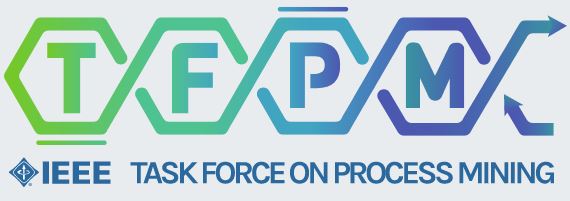- EdbA'23 -
Fourth International Workshop on Event Data and
Behavioral Analytics
Rome, Italy, 23 October 2023
Co-located at ICPM 2023

An activity from the IEEE Task Force on Process Mining
Over the past decades, capturing, storing and analyzing event data has gained attention in various domains such as process mining, clickstream analytics, IoT analytics, e-commerce and retail analytics, online gaming analytics, security analytics, website traffic analytics and preventive maintenance, smart homes and offices, just to name a few. It even resulted in the birth of new research domains such as behavioral informatics, behavioral analytics and behavioral operations research. The interest in event data lies in its analytical potential as it captures the dynamic behavior of people, objects and/or systems at a fine-grained level.
While each of these domains have their own applications and idiosyncrasies, they share the common denominator of event data and the objective to analyze behavior. Yet, these domains also differ in underlying assumptions and techniques used. Therefore, the objective of this workshop is to provide a forum to practitioners and researchers for studying a quintessential, minimal notion of events as the common denominator for records of discrete behavior in all its forms, and to study, develop and discuss techniques and methods for behavioral analytics based on all kinds of events.
The Event Data & Behavioral Analytics (EdbA) workshop considers as its starting point the presence of event data being recorded at various sources and contexts, being stored in various forms, and being considered for analysis of behavior of various kinds. Event data at different levels of granularity are considered, ranging from frequent sensor-based events in IoT settings to recordings of aggregate or long-running behavior involving time intervals and rich information. Behavior often involves multiple entities, objects, and actors to which events can be correlated in various ways. In these situations, a unique explicit process notion does either not exist, is unclear or different processes or dynamics could be recorded in the same dataset.
The workshop aims to further the development of new (or the novel application of existing) techniques, algorithms and data structures for recording, storing, managing, processing, analyzing, and visualizing event data in various forms. The workshop welcomes two types of submissions, i.e. original research papers as well as case study reports on event data and behavioral analytics.
The topics considered in the workshop consist of, but are not limited to:
- Augmentation of fine-grained event data to higher-order activities or behavior
- Storage, integration, and querying of behavioral event data
- Representation and analysis of event data without a unique case identifier (without case identifier or with multiple case identifiers present)
- Monitoring and detection of complex behavior
- Diagnosis of behavior, including root-cause analysis, variance analysis, cluster analysis and many other exploratory analysis techniques
- Visual analytics of (complex) behavior
- Behavior Pattern detection, e.g., in real-time location data or other types of context-rich data
- Outlier Behavior Detection
- Behavior Prediction
- Prescriptive analytics which predicts behavior and prescribes which action could steer behavior in a specific direction
- Ying Liu, Vinicius Stein Dani, Iris Beerepoot and Xixi Lu. Turning Logs Into Lumber: Preprocessing Tasks in Process Mining. (pdf)
- Roberta De Fazio, Laura Verde, Antonio Balzanella, Stefano Marrone, Fiammetta Marulli, Vincenzo Reccia and Paolo Valletta. CaseID detection for Process Mining: a heuristic-based methodology. (pdf)
- Yannis Bertrand, Silvestro V. Veneruso, Francesco Leotta, Massimo Mecella and Estefanía Serral. NICE: The Native Iot-Centric Event Log Model for Process Mining. (pdf)
- Alexandre Goossens, Adrian Rebmann, Johannes De Smedt, Jan Vanthienen and Han van der Aa. From OCEL to DOCEL – Datasets and Automated Transformation. (pdf)
- Zahra Ahmadi, Yannis Bertrand, Maria Isabel Pozo Romero and Estefanía Serral. Analysing the Foraging Behaviour of Bees using Process Mining: A Case Study. (pdf)
- Anti Alman, Alessio Arleo, Iris Beerepoot, Andrea Burattin, Claudio Di Ciccio and Manuel Resinas. Tiramisu: A Recipe for Visual Sensemaking of Multi-Faceted Process Information. (pdf)
- Dina Kretzschmann, Gyunam Park, Alessandro Berti and Wil M.P. van der Aalst. Overstock Problems in a Procurement Process: An Object-Centric Process Mining Case Study.
- Eva Klijn, Lulzim Imeri, Florin Baumann, Dennis Preuss, Felix Mannhardt and Dirk Fahland. Event Knowledge Graphs for Auditing: A Case Study. (pdf)
- Christian Rennert and Wil M. P. van der Aalst. Improving Precision in Process Trees Using Subprocess Tree Logs. (pdf)
- Onur Dogan and Massimiliano de Leoni. Parallelism-based Session Creation to Identify High-Level Activities in Event Log Abstraction. (pdf)
- Jochem Veldman, Xixi Lu, Wouter van der Waal, Marcus Dees and Inge van de Weerd. Generating Process Anomalies with Markov Chains: A Pattern-Driven Approach. (pdf)
- Discussion on open problems, issues and trends in event data and behavioral analytics
All accepted papers are published by Springer in the Lecture Notes in Business Information Processing (LNBIP) series.
Organizing Committee
- Depaire Benoît, Hasselt University, Belgium
- Fahland, Dirk, Eindhoven University of Technology, the Netherlands
- Leotta, Francesco, Sapienza University of Rome, Italy
- Lu, Xixi, Utrecht University, the Netherlands
Program Committee
- Yannis Bertrand, Katholieke Universiteit Leuven, Belgium
- Andrea Burattin, Technical University of Denmark, Denmark
- Ioannis Chatzigiannakis, Sapienza University of Rome, Italy
- Massimiliano de Leoni, University of Padua, Italy
- Jochen De Weerdt, Katholieke Universiteit Leuven, Belgium
- Gemma di Frederico, Technical University of Denmark, Denmark
- Chiara Di Francescomarino, Fondazione Bruno Kessler-IRST, Italy
- Bettina Fazzinga, DICES, University of Calabria, Italy
- Laura Genga, Eindhoven University of Technology, the Netherlands
- Marwan Hassani, Eindhoven University of Technology, the Netherlands
- Gert Janssenswillen, Hasselt University, Belgium
- Agnes Koschmider, Kiel University, Germany
- Felix Mannhardt, Eindhoven University of Technology, the Netherlands
- Niels Martin, Hasselt University, Belgium
- Massimo Mecella, Sapienza University of Rome, Italy
- Jan Mendling, Humboldt-Universität zu Berlin, Germany
- Marco Pegoraro, RWTH Aachen University, Germany
- Estefania Serral, Katholieke Universiteit Leuven, Belgium
- Stef van den Elzen, Eindhoven University of Technology, the Netherlands
- Greg Van Houdt, Hasselt University, Belgium
- Francesca Zerbato, University of St. Gallen, Austria